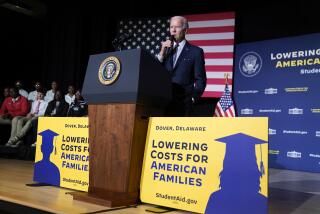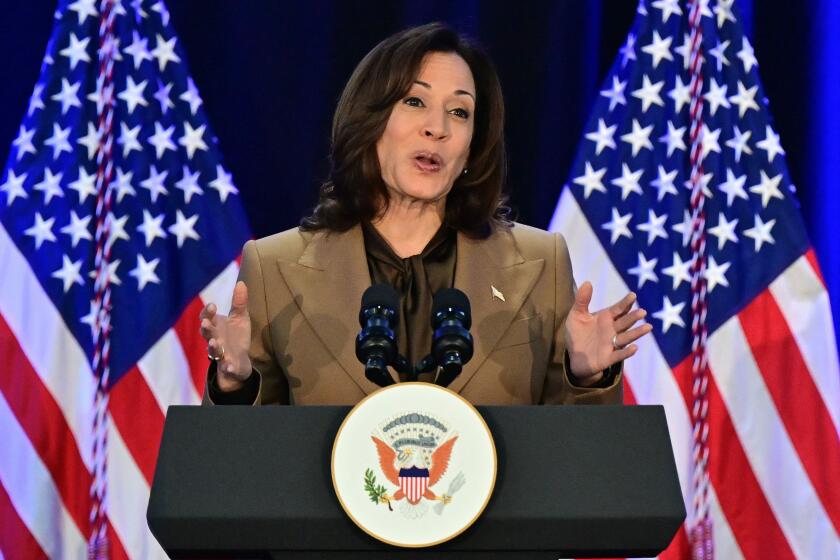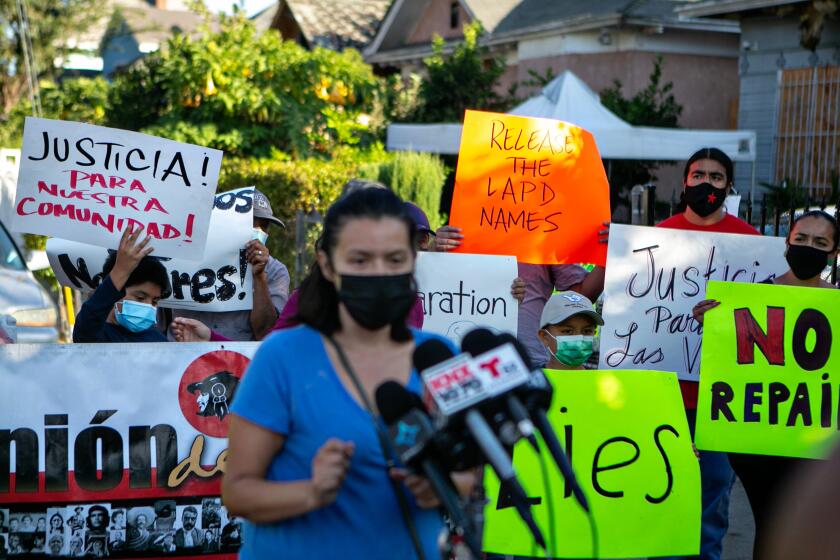Piety and Power : Judaism: Habad’s charismatic Grand Rabbi can bring governments to heel but followers say his greatest power is in drawing Jews back into the fold.
Elana Traub, owner of the tony Ted Lapidus shop on Beverly Hills’ Rodeo Drive, took time from a recent buying trip in Manhattan to travel deep into the tumbledown neighborhoods of Brooklyn to see an elderly rabbi with piercing blue eyes.
Known to his followers simply as the Rebbe, Rabbi Menachem Mendel Schneerson leans on a worn velvet podium for hours every Sunday palming crisp $1 bills into the hand of thousands of followers who want a brush of his power, a touch of the piety.
Schneerson, 88, is head of the most dynamic and controversial sect of Orthodox Judaism, the Lubavitch, a Hasidic movement of strictly observant Jews.
“There is something very special about this man,” Traub said.
Indeed, his power stretches from the Crown Heights section of Brooklyn to such far-flung outposts as Australia and Nepal. And just last month his followers throttled the course of peace in the Middle East, saying they were simply listening to their Rebbe.
When it was Traub’s turn to greet Schneerson, the slim Westsider wearing purplish lipstick introduced herself as a Californian. The Rebbe pushed one bill, then another into her hand. “A prayer for you,” he said in Hebrew. “And one for the state of California.”
Schneerson’s gifts are supposed to go to charity, but Traub was so ecstatic that, after making her way past scores of beggars outside the Rebbe’s headquarters, she had her dollar bills laminated in plastic by a merchant on Eastern Parkway.
“The way he looks you straight in the eyes is very moving,” gushed Traub, who says she is not the most devout of Jews but is an enthusiastic contributor to the Lubavitch movement. “It’s obvious he’s quite a powerful individual.”
But the Rebbe’s influence--particularly over politics in Israel, which he never has visited--has recently left some supporters wondering whether he is the keeper of a religious flame or a force involved in burning down the Israeli political house.
Schneerson has the ultimate kind of power in Israel; he can remain aloof from that nation’s back-room politics, yet a few of his chosen words carry a message that can bring its political system to a halt.
That occurred in late March, when, shortly after Prime Minister Yitzhak Shamir’s government fell in a no-confidence vote, opposition leader Shimon Peres tried to form a new majority in the Israeli parliament, the Knesset.
But Peres’ Labor Party fell two votes short in its effort, because Knesset members Avraham Verdiger and Eliahu Mizrahi abandoned the Labor coalition at the last minute after contact with the Rebbe’s people in Brooklyn. (Both Verdiger and Mizrahi owe allegiance to the Rebbe, because, shortly before the 1988 election, the Lubavitch resuscitated their failing Agudat Israel Party with $1 million and considerable manpower.)
At one point this month, Verdiger actually called Brooklyn to ask whether the Rebbe still believed it was against Jewish law to trade land for peace--a key element of the Labor Party’s platform for dealing with the Arab-Jewish conflict in the occupied territories of the West Bank and Gaza strip.
Verdiger was told by a close Schneerson aide that the Rebbe had not changed his interpretation of the law: that “land could not be ceded under any circumstances when Jewish lives are at stake,” said Rabbi Yehuda Krinsky, the Rebbe’s spokesman. “The answer was one that anyone could have told them. The Rebbe does not change views and he does not get involved in politics.”
Other rabbis of Hasidic or ultra-orthodox sects have interpreted the Jewish law differently, arguing that peace is a greater principle than land. But the Rebbe’s power was weightier.
After struggling for five difficult weeks, Peres formally surrendered his mandate Thursday to form a government, and Shamir is expected to form his own coalition within the week.
The Rebbe, meantime, has been widely condemned by American Jewish leaders, not so much for his effect on the politics of the moment but for the overall aspirations and prominence of the movement also known as the Habad.
“All Jews who care about Israel want to have some influence in Israel and I can understand the Rebbe trying to have the same,” said Rabbi David Lieber, president of Los Angeles’ University of Judaism, which is associated with the Conservative movement. “But I resent him trying to push Habad interests there. His is not a pluralistic movement, and every time he gets involved, he ends up polarizing the whole Jewish world.”
Rabbi Alexander Schindler, who heads the Reform movement, also issued a statement saying the Rebbe’s actions illustrate why electoral reform is “absolutely necessary in Israel. . . . The alternative is a continued stalemate and continued surrender to the needs and desires of the ultra-Orthodox fringe parties that hold the balance of power in Israel’s Knesset.”
Stanley Scheinbaum--a prominent, Westside Jewish activist who has been pushing for Israel to talk with the Palestinians--was disappointed by the effect of the Rebbe’s words on peace efforts in the Middle East. “We were so close to getting somewhere,” Scheinbaum said, adding, “This type of move scares me, because it injects non-rational thinking into a democratic system.”
But Rabbi Boruch Shlomo Cunin, director of the Lubavitch’s West Coast operations, said that to hold the Rebbe responsible for Israel’s complex problems is absurd: “The Rebbe is just not focused on such things. More important to him is what can be accomplished through our 1,000 institutions around the world.
“The fact is,” he continued, “when a Jewish kid in L.A., even a non-Jewish kid, is in trouble, where does he go? He goes to a Habad house. And after (staying there), maybe he’ll be a little more Jewish, too. Maybe he’ll do one more thing to follow the law. That’s what the Rebbe is all about.”
In the 40 years since Schneerson became Grand Rabbi, the Habad--a Hebrew acronym for wisdom, understanding and knowledge”--has grown from a tiny movement with a scattered following to a broad-based network with as many as 1 million adherents. They periodically are linked by a communications satellite that broadcasts the Rebbe’s speeches from his Brooklyn study.
Begun in the Eastern European shtetls of the 18th Century, the Lubavitchers have become deft in using 20th-Century technology to get out their message, which is steeped in mysticism and ritual.
There is an annual Habad telethon in Los Angeles; it raised $5 million last year by employing the unlikely combination of Hollywood glitz and Hasidic piety. A Habad publishing house issues 200 new hardcover titles each year. The Habad “Jewish Family Expo,” with booths and balloons like any secular convention, runs every year in Manhattan. There are yeshivas and summer camps, drug rehabilitation programs and roaming “mitzva tanks,” or Winnebago-type campers that Lubavitchers use to get non-observant Jews to perform required daily rituals.
The organization is said to have a $100-million annual budget. But Krinsky calls that figure a “very modest estimate.”
Most of the money is donated by Jews who have abandoned religious observance but want to sustain what they think is an authentic representation of Judaism. “Some of us see it as guilt money,” said Chaim Seidler-Feller, head of the Jewish student program at UCLA. “And the Habad feeds on that.”
But unlike people in other ultra-observant sects, most of whom live cloistered existences, the Lubavitchers have fashioned a mission--to go out into the world and to draw secular Jews back into the fold.
Perhaps the Habad’s most important work is performed by young missionaries such as Eli Lipsker’s daughter, Shoshana, who, with her husband and two small children, moved to Omaha last year to establish “another Habad institution.” That means they moved into a small house opened it to the tiny Jewish community for regular observances. Unlike other movements, the Hasidic sects try to follow all of the 613 rules of Jewish life codified by Maimonides in the 12th Century.
During a recent interview at a New York restaurant (“Crown Bagels--It Ain’t Just Bagels”), Lipsker, a musician who moved to Crown Heights to be near the Rebbe, spoke proudly of the work of his daughter and her family: “They are there to help people with the Judaism they lack. They work hard under difficult conditions. But they have the Rebbe as inspiration.”
Indeed, to the faithful, there is the possibility that their Rebbe--the seventh in a dynastic tradition begun in the Belorussian town of Lubavitch--is the Messiah, the deliverer of the Jews.
“In every generation, in every movement, from the time of Moses, rabbis have thought their Rebbe was the best candidate for the moshiach ,” Cunin explained. “When you talk to the Habad, we think our Rebbe is the best candidate for our generation.”
But most Jews do not take literally the teaching that the Messiah will come in the form of a human being now on Earth; throughout history, there have been at least half a dozen proclamations of false Messiahs.
Schneerson himself has never claimed to be the Messiah. But as his critics point out, he has also never denied it.
Schneerson is widely acknowledged to be one of the most learned scholars of the Torah, the whole body of Jewish religious literature. Yet he is also a proponent of a brand of mysticism that involves such things as curses and miracles. Lately, he also has been quoted as having conversations with his dead father-in-law, the previous Rebbe, whose grave in Queens he visits often.
“I’m sure the Rebbe is a fine gentleman but there is an inherent danger when his followers think that he’s The One,” said Lieber. “They take his every word as divine commandment, which creates a type of uncontrolled fervor on the streets.”
However, it is not his followers’ zeal but the thorny question of who his successor will be that is a more immediate problem. That’s because the Rebbe, who had a massive heart attack a decade ago, has not only grown old but also has no children.
Schneerson’s inner circle refuses to address the issue of his succession. “If you’re a student of Jewish history, you know God has always provided leadership for His people,” Krinsky said.
Born in Russia, Schneerson moved to Berlin shortly after marrying the youngest of the previous Rebbe’s three daughters. At the University of Berlin, Schneerson studied math and philosophy. He was also known to enjoy such worldly delights as a double feature at the movies.
Later, he and his wife moved to Paris, where he earned a degree in electrical engineering at the Sorbonne. He speaks 10 languages and has published 28 hardcover volumes of excerpts from his speeches.
Schneerson followed his late father-in-law to America from Warsaw while fleeing the Nazis. When he first moved to Brooklyn, Schneerson got a job in a machine shop. But after the death of his father, the Jewish requirement that he say a daily prayer for the dead put a crimp in his commitment to that labor; he went to work for his father-in-law editing books.
It was then that Schneerson began making regular speeches about the Talmud, the collection of writings constituting Jewish civil and religious law. It was then that he began to show the makings of a charismatic leader.
There was a yearlong succession battle between Schneerson and his brother-in-law; some of the bad blood has spilled over to a current dispute in the family and other Hasidic sects.
These tensions and the Rebbe’s recent role in preventing Israel’s talks with the Palestinians have raised concern among his inner circle for his safety. Just last week, the Rebbe’s picture appeared on the front pages of newspapers in Cairo and Libya, sending shock waves through Crown Heights.
At the prompting of the Lubavitchers, New York City police are considering offering protection to the Rebbe, who has left the square-mile between his home and his headquarters only a handful of times in 40 years.
Yet there are those who wonder if the Rebbe himself, with his own words, has fueled the fears of Palestinian reprisals.
After an afternoon prayer one day last week, for example, he stunned his followers--who often struggle not only to interpret but to hear the Rebbe’s speeches--when he said without further explanation that he had special knowledge that the Palestinian Liberation Organization planned to increase its terrorist activities against Jews worldwide.
As for Jews themselves, he advised them to be “charitable, kinder, more devout.”
“The strength of the Jews,” he observed, “is with the tongue, not arms.”
More to Read
Start your day right
Sign up for Essential California for news, features and recommendations from the L.A. Times and beyond in your inbox six days a week.
You may occasionally receive promotional content from the Los Angeles Times.






